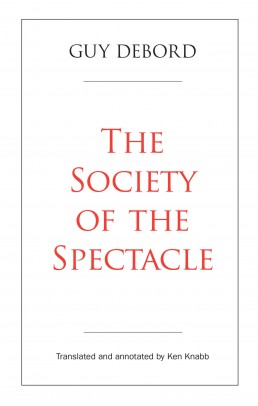
The Society of the Spectacle
Guy Dubord
Guy Debord’s (1931–1994) best-known work, The Society of the Spectacle (1967), is a polemical and prescient indictment of our image-saturated consumer culture. The book examines the “Spectacle,” Debord’s term for the everyday manifestation of capitalist-driven phenomena; advertising, television, film, and celebrity.
Debord defines the spectacle as the “autocratic reign of the market economy.” Though the term “mass media” is often used to describe the spectacle’s form, Debord derides its neutrality. “Rather than talk of the spectacle, people often prefer to use the term ‘media,’” he writes, “and by this they mean to describe a mere instrument, a kind of public service.” Instead, Debord describes the spectacle as capitalism’s instrument for distracting and pacifying the masses. The spectacle takes on many more forms today than it did during Debord’s lifetime. It can be found on every screen that you look at. It is the advertisements plastered on the subway and the pop-up ads that appear in your browser. It is the listicle telling you “10 things you need to know about ‘x.’” The spectacle reduces reality to an endless supply of commodifiable fragments, while encouraging us to focus on appearances. For Debord, this constituted an unacceptable “degradation” of our lives.
